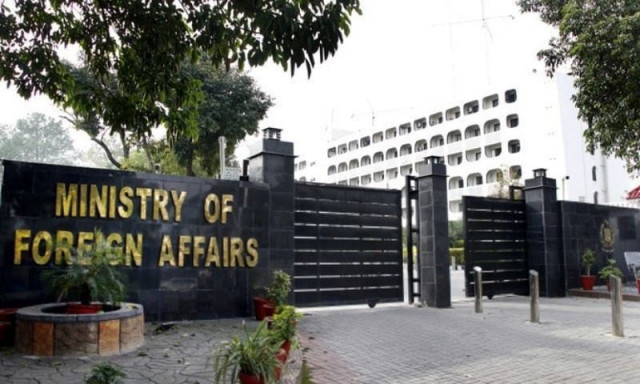Ministry of Foreign Affairs. Photo: File
ISLAMABAD:
Pakistan on Sunday warned that it would treat the Afghan Taliban regime as an enemy if it continued to provide shelter and support to terrorist groups such as the banned Tehreek-e-Taliban Pakistan (TTP) and the Baloch Liberation Army (BLA).
“TTP/FaK [Fitna al-Khawarij] and BLA/FaH [Fitna al-Hindustan] are avowed enemies of the State of Pakistan and its people. Anyone who harbors, encourages or finances them is not considered a friend and sympathizer of Pakistan and its people,” the Foreign Office said in a strongly worded statement.
The statement followed the conclusion of the third round of Pakistan-Afghanistan talks held in Istanbul on November 7, mediated by Turkey and Qatar. The Foreign Ministry said Pakistan “deeply appreciates” the sincere efforts of the two brotherly nations to iron out differences between Islamabad and Kabul.
on the “central issue of terrorism emanating from Afghan soil”.
Over the past four years, since the Taliban returned to power in Kabul, Pakistan has witnessed a sharp increase in terrorist attacks from Afghanistan. Despite the military and civilian losses, the Foreign Ministry noted that Pakistan had “exercised maximum restraint and did not retaliate”, hoping that the Taliban regime would eventually bring these groups under control.
However, the statement expressed disappointment that despite Pakistan’s goodwill gestures, including trade concessions, humanitarian aid and facilitation of educational and medical visas, the Taliban’s response remains “empty promises and inaction”.
“Instead of acting in accordance with Pakistan’s basic expectations of not allowing Afghan territory to be used for attacks against Pakistan, the Taliban regime has always tried to avoid taking concrete and verifiable steps,” the statement added.
Islamabad has accused the Taliban government of deliberately confusing the central issue of terrorism by raising “irrelevant and hypothetical” concerns to evade its commitments.
The Foreign Office said Pakistan’s response in October 2025 to constant cross-border attacks reflected its determination to “leave no stone unturned to protect its territory and people.”
While reaffirming its support for peace and diplomacy, Pakistan made it clear that “the use of force remains the option of last resort.” The country agreed to participate in talks brokered by Turkey and Qatar “to give every possible chance for peace.”
According to the statement, during the first round of negotiations in Doha, the two sides reached an agreement on the principles of cooperation and accountability, after which Pakistan agreed to a temporary ceasefire. The second round in Istanbul aimed to design a mechanism to implement these measures, but the Taliban “avoided taking action on the ground and reneged on their commitments.”
During the third round, Pakistan once again sought to focus on creating an effective monitoring mechanism, but the Afghan side “attempted to dilute the focus on terrorism and extend the ceasefire without taking verifiable action against TTP and BLA militants.”
The Foreign Office said the Taliban regime was “attempting to misrepresent the issue of Pakistani terrorists hiding in Afghanistan as a humanitarian issue”. He recalls that after Operation Zarb-e-Azb in Pakistan in 2015, TTP militants fled to Afghanistan, helped the Taliban in their fight against ISAF forces and were now sheltered “as revenge”. These militants, he adds, have established training camps to launch attacks inside Pakistan.
Islamabad demanded their surrender, but the Taliban regime “repeatedly refused to do so,” citing a lack of control. “More than a question of capacity, it has become a question of intention,” the Foreign Ministry said, warning that “empty hopes and hollow promises have lost their effectiveness.”
“This is not a humanitarian or refugee issue, but a ploy to portray terrorists as refugees,” the statement said, adding that Pakistan is ready to welcome any Pakistani living in Afghanistan “provided they are handed over to the border posts and not rushed through Afghanistan fully armed”.
Pakistan asserted that it “never avoided dialogue with any government in Kabul,” but made it clear that it “would not engage in dialogue with any terrorist group.”
The Foreign Office said that while some within the Taliban “do not want confrontation with Pakistan”, there is a “powerful lobby, with financial support from foreign actors, responsible for stoking tensions” by slandering Pakistan. These elements, he says, are “eroding the goodwill they once had in Pakistan”.
The statement also rejects Taliban propaganda about divisions in Pakistan over Afghan policy. “It is absolutely clear among the people of Pakistan that the nation is united with its armed forces to safeguard its interests and its people,” he said.
Reiterating Pakistan’s position, the statement warns that the Taliban regime “cannot deny the sharp rise in terrorism from Afghanistan” since August 2021. It also criticizes attempts to “incite Pashtun nationalism in Pakistan”, recalling that “more Pashtuns live in Pakistan than in Afghanistan” and are well integrated into the social and political structures of the state.
“Instead of encouraging Pashtunism in Pakistan, it would be wise for the Taliban regime to examine its own qualities of inclusiveness,” the foreign ministry added.
The statement concluded by reaffirming Pakistan’s commitment to peace, but emphasized that “terrorism emanating from Afghanistan must be combatted first and foremost.”
“ Mandated by Parliament and the Constitution, the Armed Forces of Pakistan have made innumerable sacrifices in the war against terrorism and will continue to do so, with the full support of the people of Pakistan,” the Foreign Office said.




